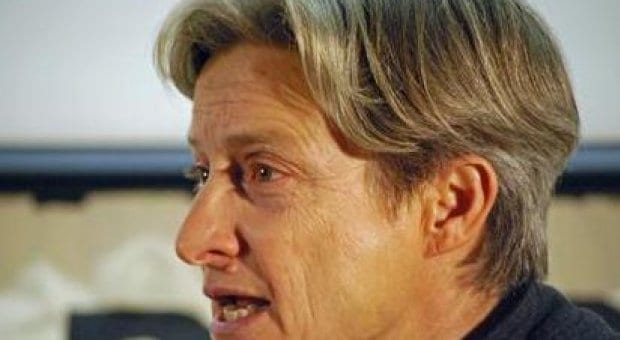Renowned scholar Judith Butler received an honorary doctorate from McGill University’s Faculty of Religious Studies at a May 29 ceremony in Montreal. Standing on a podium with dignitaries from McGill University and its board of governors, Butler addressed graduating students from the faculties of arts and religious studies.
Christopher Manfredi, dean of McGill’s Faculty of Arts, avoided commenting on the public opposition to McGill’s nomination voiced by some in the media and from within McGill University when he introduced Butler to a packed audience (most of whom were already sweltering before convocation ceremonies began under a white awning that covered an acre of McGill’s campus in downtown Montreal).
The previous week, McGill Students for Israel released a statement condemning Butler’s nomination for an honorary degree, singling out her support for Boycott, Divestment and Sanctions (BDS) Movement against Israeli institutions and products.
In his Daily Beast column, Gil Troy, a professor of history at McGill, railed against Butler’s support of BDS, accusing her of “amoral, sloppy, politically correct identity politics.”
Troy echoed statements made in 2011 by Chancellor Heather Munroe-Blum, who accused those calling for McGill to break ties with Hebrew University of “moral cowardice.”
In a vigorous response to Troy on the Huffington Post, Darin Barney, a professor of communication studies at McGill, accused Troy of relying on “misrepresentation, stereotyping and scapegoating rather than engaging [Butler’s] arguments.”
Dean Manfredi highlighted Butler’s contributions to gender and sexuality studies for their “paradigm-shifting” influence. He noted how Gender Trouble, Butler’s 1990 monograph on the social construction of gender, questioned the “key assumptions of first- and second-wave feminism.”
In her speech, Butler described the university as one of the few places to learn about gender and sexuality, while also noting that “effective policies on gender, sexual and racial harassment” remain politicized issues on campuses.
Carrie Rentschler, director of McGill’s Institute for Gender, Sexuality and Feminist Studies, “hooded” Butler with a scarlet sash, ceremoniously granting the honorary doctorate. The IGSF also hosted an invitation-only reception for Butler after the convocation ceremonies at which she discussed her current research with select faculty and graduate students.
Despite the evolution of her own scholarly work away from direct engagement with queer theory, Butler’s contributions to gay and lesbian scholarship and activism was reflected in the dean of arts’ introduction and the fact that the university’s equity subcommittee on queer people spearheaded her nomination.
While much of her short speech extolled the role of critical thinking in allowing students to “shake off what we know in order to lend our imagination to sometimes violent and agonistic spectrums of experience,” Butler also commended the public protests of Quebec’s Maple Spring, drawing some cheers from the crowd of students. She ended her short speech in French by thanking the university and urging students to live transformative lives.

 Why you can trust Xtra
Why you can trust Xtra


